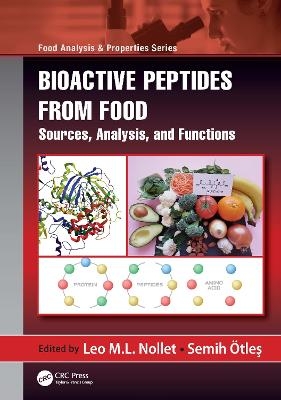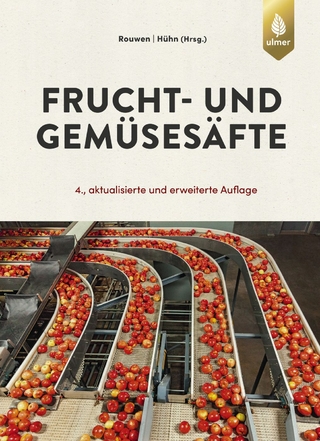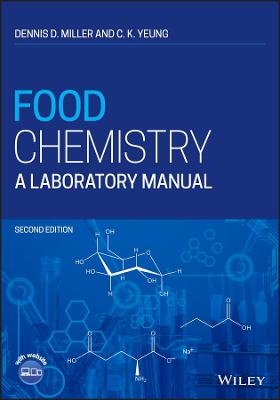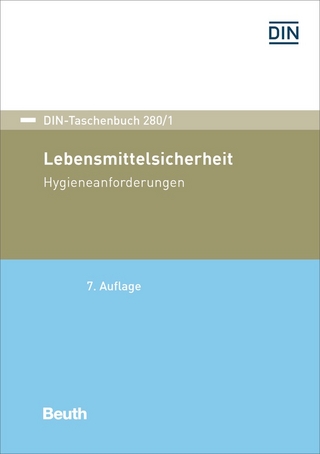
Bioactive Peptides from Food
CRC Press (Verlag)
978-0-367-60853-8 (ISBN)
A growing body of scientific evidence has revealed that many food peptides exhibit specific biological activities in addition to their established nutritional value. Bioactive peptides present in foods may help reduce the worldwide epidemic of chronic diseases that account for a great number of premature deaths annually. Bioactive peptides can be defined as isolated small fragments of proteins which provide some physiological health benefits. They act as potential modifiers reducing the risk of many chronic diseases.
Bioactive Peptides from Food: Sources, Analysis, and Functions considers fundamental concepts, sources, hydrolysis, fractionation, purification, analysis, chemical synthesis, functions, and regulatory status of nutraceutical bioactive peptides. Methods of isolation of these peptides from different protein sources with their in vitro and vivo physiological effects are addressed. Divided into seven sections, this book delves into how these peptides play a major role in the development of various functional foods. Numerous bioactive peptides have been reported in recent years as naturally present or generated from food proteins of different origins like milk, eggs, soya, fish, and meat.
Key Features:
Includes a detailed study of the different sources of bioactive peptides
Discusses the health benefits, such as antimicrobial, antiallergic, antihypertensive, antitumor, and immunomodulatory properties of peptides
Explorates the state of the art analysis methods of peptides
Discovers the bioinformatics of possible bioactive peptides
Written by experts in their field from around the world, Bioactive Peptides from Food reveals the world of databases of peptides. It is a great resource for food scientists, technologists, chemists, nutrition researchers, producers, and processors working in the whole food science and technology field as well as those who are interested in the development of innovative functional products.
Leo M. L. Nollet earned an MS (1973) and PhD (1978) in biology from the Katholieke Universiteit Leuven, Belgium. He is an editor and associate editor of numerous books. He edited for M. Dekker, New York—now CRC Press of Taylor & Francis Publishing Group—the first, second, and third editions of Food Analysis by HPLC and Handbook of Food Analysis. The last edition is a two-volume book. Dr. Nollet also edited the Handbook of Water Analysis (first, second, and third editions) and Chromatographic Analysis of the Environment, third and fourth editions (CRC Press). With F. Toldrá, he coedited two books published in 2006, 2007, and 2017: Advanced Technologies for Meat Processing (CRC Press) and Advances in Food Diagnostics (Blackwell Publishing—now Wiley). With M. Poschl, he coedited the book Radionuclide Concentrations in Foods and the Environment, also published in 2006 (CRC Press). Dr. Nollet has also coedited with Y. H. Hui and other colleagues on several books: Handbook of Food Product Manufacturing (Wiley, 2007), Handbook of Food Science, Technology, and Engineering (CRC Press, 2005), Food Biochemistry and Food Processing (first and second editions; Blackwell Publishing—now Wiley—2006 and 2012), and the Handbook of Fruits and Vegetable Flavors (Wiley, 2010). In addition, he edited the Handbook of Meat, Poultry, and Seafood Quality, first and second editions (Blackwell Publishing—now Wiley—2007 and 2012). From 2008 to 2011, he published five volumes on animal product-related books with F. Toldrá: Handbook of Muscle Foods Analysis, Handbook of Processed Meats and Poultry Analysis, Handbook of Seafood and Seafood Products Analysis, Handbook of Dairy Foods Analysis (2nd edition in 2021), and Handbook of Analysis of Edible Animal By-Products. Also, in 2011, with F. Toldrá, he coedited two volumes for CRC Press: Safety Analysis of Foods of Animal Origin and Sensory Analysis of Foods of Animal Origin. In 2012, they published the Handbook of Analysis of Active Compounds in Functional Foods. In a coedition with Hamir Rathore, Handbook of Pesticides: Methods of Pesticides Residues Analysis was marketed in 2009; Pesticides: Evaluation of Environmental Pollution in 2012; Biopesticides Handbook in 2015; and Green Pesticides Handbook: Essential Oils for Pest Control in 2017. Other finished book projects include Food Allergens: Analysis, Instrumentation, and Methods (with A. van Hengel; CRC Press, 2011) and Analysis of Endocrine Compounds in Food (Wiley-Blackwell, 2011). Dr. Nollet’s recent projects include Proteomics in Foods with F. Toldrá (Springer, 2013) and Transformation Products of Emerging Contaminants in the Environment: Analysis, Processes, Occurrence, Effects, and Risks with D. Lambropoulou (Wiley, 2014). In the series Food Analysis & Properties, he edited (with C. Ruiz-Capillas) Flow Injection Analysis of Food Additives (CRC Press, 2015) and Marine Microorganisms: Extraction and Analysis of Bioactive Compounds (CRC Press, 2016). With A.S. Franca, he coedited Spectroscopic Methods in Food Analysis (CRC Press, 2017), and with Horacio Heinzen and Amadeo R. Fernandez-Alba he coedited Multiresidue Methods for the Analysis of Pesticide Residues in Food (CRC Press, 2017). Further volumes in the series Food Analysis & Properties are Phenolic Compounds in Food: Characterization and Analysis (with Janet Alejandra Gutierrez-Uribe, 2018), Testing and Analysis of GMO-containing Foods and Feed (with Salah E. O. Mahgoub, 2018), Fingerprinting Techniques in Food Authentication and Traceability (with K. S. Siddiqi, 2018), Hyperspectral Imaging Analysis and Applications for Food Quality (with N.C. Basantia, Leo M.L. Nollet, Mohammed Kamruzzaman, 2018), Ambient Mass Spectroscopy Techniques in Food and the Environment (with Basil K. Munjanja, 2019), Food Aroma Evolution: During Food Processing, Cooking, and Aging (with M. Bordiga, 2019), Mass Spectrometry Imaging in Food Analysis (2020), Proteomics in Food Authentication (with S. Ötleş, 2020), Analysis of Nanoplastics and Microplastics in Food (with K.S. Siddiqi, 2020), Chiral Organic Pollutants, Monitoring and Characterization in Food and the Environment (with Edmond Sanganyado and Basil K. Munjanja, 2020), Sequencing Technologies in Microbial Food Safety and Quality (with Devarajan Thangardurai, Saher Islam, Jeyabalan Sangeetha, 2021), and Nanoemulsions in Food Technology: Development, Characterization, and Applications (with Javed Ahmad, 2021). Semih Ötleş, M.Sc, Ph.D. A native of Izmir, Turkey, Professor Otles obtained his B.Sc. degree from the Department of Food Engineering (Ege University) in 1980. During his assistantship at Ege University, in 1985, he received a M.S. in Food Chemistry, and in 1989, after completing his thesis research on the instrumental analysis and chemistry of vitamins in foods he received a Ph.D. in Food Chemistry from Ege University. In 1991-92, he completed postdoctoral training on meat proteins including OECD – Postdoctoral Fellowship, in the Research Center Melle at Gent University, Belgium. Afterword, he joined the Department of Food Engineering at Ege University as a scientist of Food Chemistry, being promoted to Associate Professor in 1993 and to Professor in 2000. He was Vice Dean at Engineering Faculty (2003-2009), Head of the Department of Nutrition and Dietetics (2008-2011), and Vice Rector in Ege University (2012-2016). The research activities of Professor Otles have been focused on instrumental methods of food analysis. Otles began a series of projects on the separation and instrumental analysis techniques, first for analysis of vitamins in foods, then protein chemistry, carbohydrates, carotenoids, proteomics, and most recently bioactive peptides. Other activies span the fields of instrumental food analysis like UPLC, GC, GC/MS, LC/MS/MS analysis, hyphenated techniques, soy chemistry, aromatics, medical & functional foods and nutraceutical chemistry. Included are multiresidue analysis of various foods, n-3 fatty acids in fish oils, and medical & functional foods.
Contents
Series Preface ix
Preface xi
About the Editors xiii
List of Contributors xv
SECTION 1 BIOACTIVE PEPTIDES
Chapter 1 Bioactive Peptides: An Overview 3
Alessandro Colletti and Arrigo F.G. Cicero
SECTION 2 SOURCES OF BIOACTIVE PEPTIDES
Chapter 2 Bioactive Peptides from Algae 31
Rahel Suchintita Das, Brijesh K. Tiwari, and Marco Garcia-Vaquero
Chapter 3 Meat 55
Sajad Ahmad Mir, Zahida Naseem, Danish Rizwan, and Farooq Ahmad Masoodi
Chapter 4 Dairy Products 75
Fernanda Gobbi Amorim, Larissa Zambom Côco, Francielle
Almeida Cordeiro, Bianca Prandi Campagnaro, and Rafaela Aires
Chapter 5 Seafood 97
Jesús Aarón Salazar Leyva, Rosa Stephanie Navarro Peraza,
Israel Benítez García, Emmanuel Martínez Montaño, and
Idalia Osuna Ruíz
Chapter 6 Cereals 129
Hitomi Kumagai
Chapter 7 Soybean 141
Toshihiro Nakamori
Chapter 8 Bioactive Peptides in Pulses 153
Anne Pihlanto, Elena Maestri, Markus Nurmi, Nelson Marmiroli,
and Minna Kahala
Chapter 9 Other Nonconventional Sources 181
Semih Ötleş and Vasfiye Hazal Özyurt
SECTION 3 FROM PROTEINS TO PEPTIDES
Chapter 10 Enzymatic Hydrolysis of Proteins 189
Mohammad Zarei, Belal J. Muhialdin, Kambiz Hassanzadeh,
Chay Shyan Yea, and Raman Ahmadi
Chapter 11 Protein Hydrolysates in Animal Nutrition: Industrial
Production, Bioactive Peptides, and Functional Significance 209
Yongqing Hou, Zhenlong Wu, Zhaolai Dai, Genhu Wang, and Guoyao Wu
Chapter 12 Fermentation Process: The Factory of Bioactive Peptides 233
Belal J. Muhialdin, Mohammad Zarei, Kambiz Hassanzadeh,
Chay Shyan Yea, and Raman Ahmadi
Chapter 13 Subcritical Water Extraction and Microwave-Assisted Extraction 259
Leo M.L. Nollet
Chapter 14 Fractionation and Purification of Bioactive Peptides 267
Chay Shyan Yea, Raman Ahmadi, Mohammad Zarei, and Belal J. Muhialdin
SECTION 4 ANALYSIS OF BIOACTIVE PEPTIDES
Chapter 15 Liquid Chromatography-Mass Spectrometry (LC-MS)
Analysis of Bioactive Peptides 301
Evelien Wynendaele, Kevin Van der Borght, Nathan Debunne,
and Bart De Spiegeleer
Chapter 16 Bioinformatic Analysis 321
Semih Ötleş, Bahar Bakar, and Burcu Kaplan Türköz
SECTION 5 CHEMICAL SYNTHESIS OF PEPTIDES
Chapter 17 Chemical Synthesis of Peptides 349
Javed Ahamad, Raja Kumar Parabathina, and Javed Ahmad
SECTION 6 FUNCTIONS OF BIOACTIVE PEPTIDES
Chapter 18 Antihypertensive Activity 365
Ritam Bandopadhyay, Pragya Shakti Mishra, and Awanish Mishra
Chapter 19 Bioactive Peptides in Neurodegenerative Diseases 391
Kambiz Hassanzadeh, Marco Feligioni, Mohammad Zarei,
Belal J. Muhialdin, Rita Maccarone, Massimo Corbo, and Lucia Buccarello
Chapter 20 Antimicrobial Activity of Bioactive Peptides and Their
Applications in Food Safety: A Review 415
Mohammad Hossein Maleki, Hooman Jalilvand Nezhad, Nima
Keshavarz Bahadori, Milad Daneshniya, and Zahra Latifi
Chapter 21 Opioid Activity 427
Sureal Ahmad Sheikh, Pragya Shakti Mishra, Ritam
Bandopadhyay, and Awanish Mishra
Chapter 22 Immunomodulating Activity 441
Lourdes Santiago-López, A. Alejandra López-Pérez, Lilia M.
Beltrán-Barrientos, Adrián Hernández-Mendoza, Belinda Vallejo-
Cordoba, and Aarón F. González-Córdova
Chapter 23 Bioactive Peptides: Cytomodulatory Activity 461
Carlotta Giromini and Mariagrazia Cavalleri
Chapter 24 Other Biological Functions 485
Leo M.L. Nollet
SECTION 7 REGULATORY STATUS OF BIOACTIVE PEPTIDES
Chapter 25 Regulatory Status of Bioactive Peptides 509
Faraat Ali and Javed Ahmad
Index 521
| Erscheinungsdatum | 30.03.2022 |
|---|---|
| Reihe/Serie | Food Analysis & Properties |
| Zusatzinfo | 52 Tables, black and white; 44 Line drawings, black and white; 9 Halftones, black and white; 53 Illustrations, black and white |
| Verlagsort | London |
| Sprache | englisch |
| Maße | 178 x 254 mm |
| Gewicht | 1088 g |
| Themenwelt | Technik ► Lebensmitteltechnologie |
| ISBN-10 | 0-367-60853-7 / 0367608537 |
| ISBN-13 | 978-0-367-60853-8 / 9780367608538 |
| Zustand | Neuware |
| Haben Sie eine Frage zum Produkt? |
aus dem Bereich


